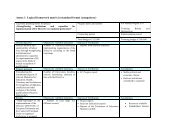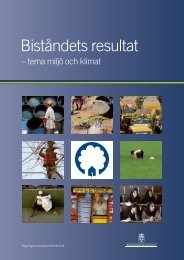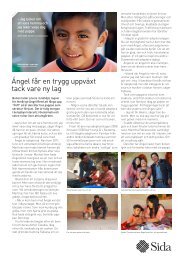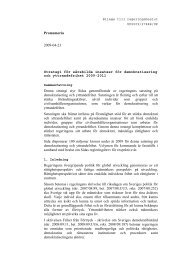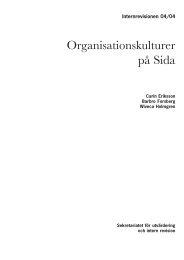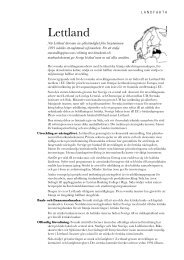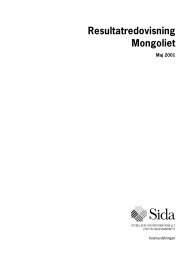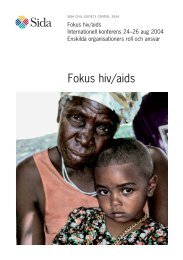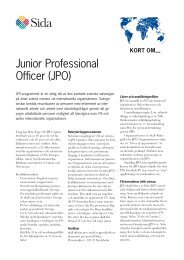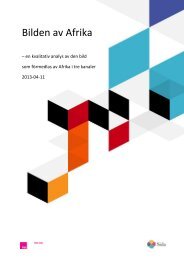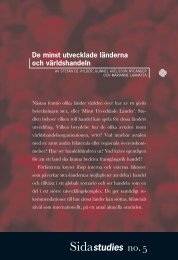Mid-Term Review of the AGIR Programme - Sida
Mid-Term Review of the AGIR Programme - Sida
Mid-Term Review of the AGIR Programme - Sida
Create successful ePaper yourself
Turn your PDF publications into a flip-book with our unique Google optimized e-Paper software.
2 F I N D I N G S<br />
affect results at <strong>the</strong> local level. Field visits by <strong>the</strong> review team note that <strong>the</strong> approach<br />
to replicate <strong>the</strong> capacity streng<strong>the</strong>ning <strong>of</strong> organisations at <strong>the</strong> local level, using national-based<br />
organisations, is not as efficient as first thought and, at least in some cases,<br />
needs complimentary measures or a different focus to be effective.<br />
Some partner organisations, contacted at <strong>the</strong> local level, noted insufficient funding to<br />
operate effectively at <strong>the</strong> local level, in stark contrast with <strong>the</strong> optimism expressed at<br />
<strong>the</strong> central level for <strong>AGIR</strong> support. This is <strong>the</strong> case <strong>of</strong> <strong>the</strong> Youth Parliament branch in<br />
Nampula, whose representative was not even aware that <strong>the</strong> organisation was receiving<br />
funding from <strong>AGIR</strong>. Local partners <strong>of</strong> <strong>the</strong> natural resource platform in Tete also<br />
received a very small proportion <strong>of</strong> <strong>the</strong> funds available in connection with <strong>the</strong> extractive<br />
industry advocacy initiative through <strong>the</strong> national platform, and express that <strong>the</strong>y<br />
could have performed more and better work if more funds had been available. Lately,<br />
due to resource constraints, some <strong>of</strong> <strong>the</strong> outreach <strong>of</strong> <strong>the</strong>se local level organisations has<br />
ended at <strong>the</strong> provincial capital. For example, <strong>the</strong> Children Network representative in<br />
Nampula noted that <strong>the</strong> received resources were not enough to implement <strong>the</strong> main<br />
activities to manage <strong>the</strong> network, let alone to implement activities at <strong>the</strong> district level.<br />
Ano<strong>the</strong>r implication <strong>of</strong> a strong focus on central partners is that certain important<br />
issues may not be addressed. For example, district decentralisation, which is linked to<br />
outcomes in <strong>the</strong> sub-programme managed by Oxfam, is not represented in <strong>the</strong> form <strong>of</strong><br />
a national platform, network or similar structure. This has, to some extent, negatively<br />
affected outcomes in this field, whereas at <strong>the</strong> local level <strong>the</strong>re are strong organisations<br />
and networks with <strong>the</strong> capacity to generate change and impact that address decentralised<br />
district planning.<br />
Some organisations at <strong>the</strong> local level also mentioned that <strong>the</strong> centralisation <strong>of</strong> training<br />
is limiting <strong>the</strong> participation <strong>of</strong> staff from <strong>the</strong> local level, since some <strong>of</strong> <strong>the</strong> training<br />
activities carried out at <strong>the</strong> central level only include representatives <strong>of</strong> some provinces.<br />
Generally, in <strong>the</strong> two provinces visited, Nampula and Tete, most <strong>of</strong> <strong>the</strong> interviewed<br />
local organisations had only participated in training provided at <strong>the</strong> central<br />
level and with o<strong>the</strong>r organisations. There were actually some training activities at <strong>the</strong><br />
local level, but <strong>the</strong> model <strong>of</strong> replication and decentralisation has worked well with<br />
some and not with o<strong>the</strong>rs, hence creating a risk <strong>of</strong> ineffectiveness.<br />
For example, Diakonia provided training in Beira and IBIS and SCC have held decentralised<br />
partner forums in Tete with all <strong>the</strong>ir respective partners. These forums have<br />
included some capacity development content: e.g. on results-based monitoring and<br />
experience exchange. In some cases ‘training <strong>of</strong> trainers’ was adopted to allow for <strong>the</strong><br />
replication <strong>of</strong> <strong>the</strong> training, but only in some areas and to some organisations. For example,<br />
ORAM received training on RBM that allowed it to replicate this in its organisation.<br />
This triggered interest from o<strong>the</strong>r colleagues and branches. ORAM requested<br />
more training to <strong>AGIR</strong>, which was provided to all delegations/branches. In a different<br />
process, <strong>the</strong> organisation was trained in gender but was not able to replicate this to<br />
o<strong>the</strong>r branches; although <strong>the</strong>re was a high demand for this training in <strong>the</strong> provincial<br />
60



